We are thrilled to welcome Jennifer Berg and her brand, Native Knitter, into the Faherty fam. As a Diné artist and knitwear designer, she shares the beauty of her culture’s artistry by incorporating Native designs into the patterns she creates.
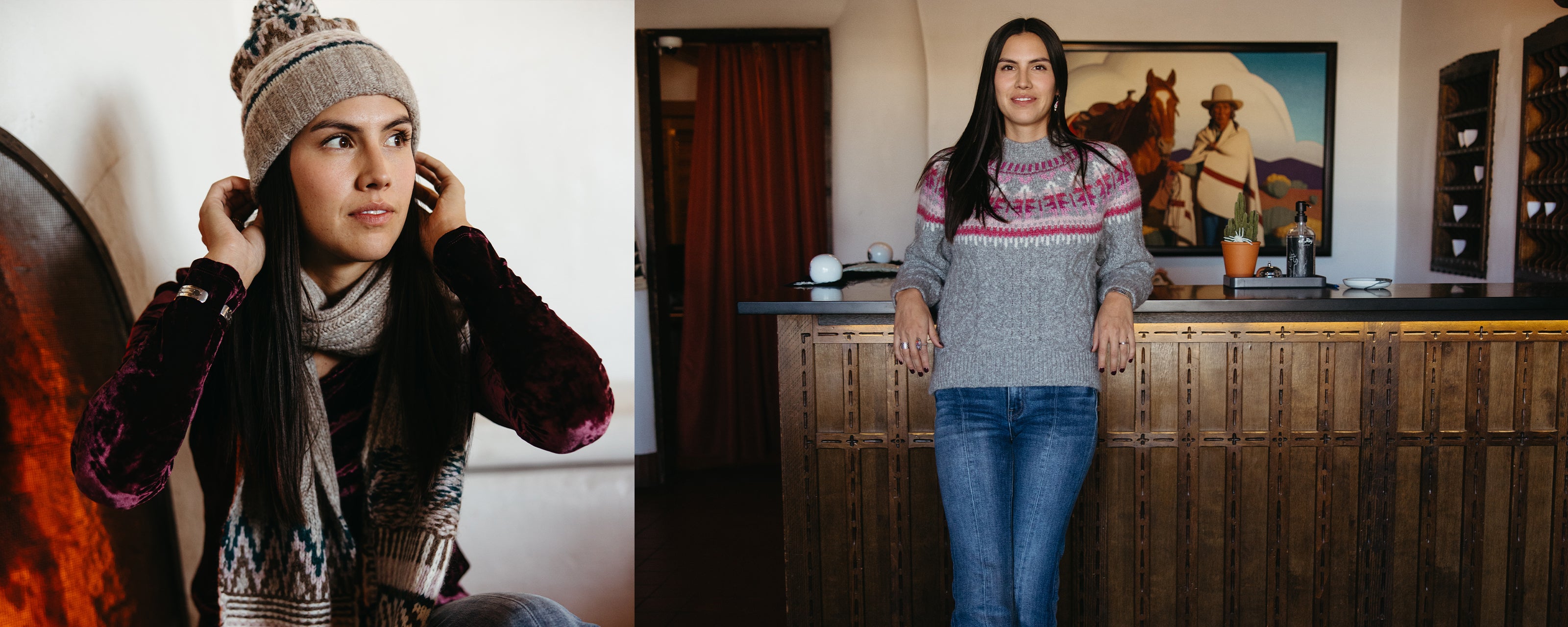
“Growing up, I was always surrounded by Native artwork,” Jennifer tells us of her adolescence growing up on the reservation in Arizona. “I learned about the stories behind each piece and the significance they held in my culture. At a young age, my parents taught me the importance of preserving our traditions and educating others about our way of life.” Jennifer is cultivating that same admiration and respect for Diné values in her children as she nurtures them in Arizona. Textiles are an integral part of Diné craftsmanship, so each design she creates is a new step in a rich and storied history of weaving.
Berg inspires an inclusive community for anyone who shares her passion for knitting and supporting Native culture. Read on for our interview with Jennifer about how what led her to pursue knitwear design, the role sustainability plays in her work, the journey of partnering with Faherty, and so much more.
Diné craftsmanship has a long and incredible history. What place did it have in your life as you were growing up?
A little background to where and who I come from: My parents run our family business out on the Navajo Reservation, named Chee’s Indian Store. “Chee” is our family name, meaning Red in Navajo. My family takes pride in supporting local artists on the reservation and neighboring tribes (Zuni, Hopi, Apache). The store began with my great-grandmother Eva Chee. She was a weaver and decided to open a stand on old Route 66 to sell her items. Later as I-40 was created, they moved the stand up the hill and had an exit, where they created a more substantial structure.
This past year, the store received the Tourist award from the Navajo Nation. It was a major honor for my family. It not only recognized their hard work and dedication over the last 30 years but also highlighted the importance of Navajo family-owned businesses in our community. We are proud to be a part of the economic growth and cultural preservation of our tribe.
As I look to the future, I hope to carry on the legacy of our family business. I want to continue supporting local artists, sharing our culture with others, and ensuring that future generations have a place to learn and appreciate Native American art. Chee's Indian Store has become more than just a business; it is a testament to the resilience and strength of our people.
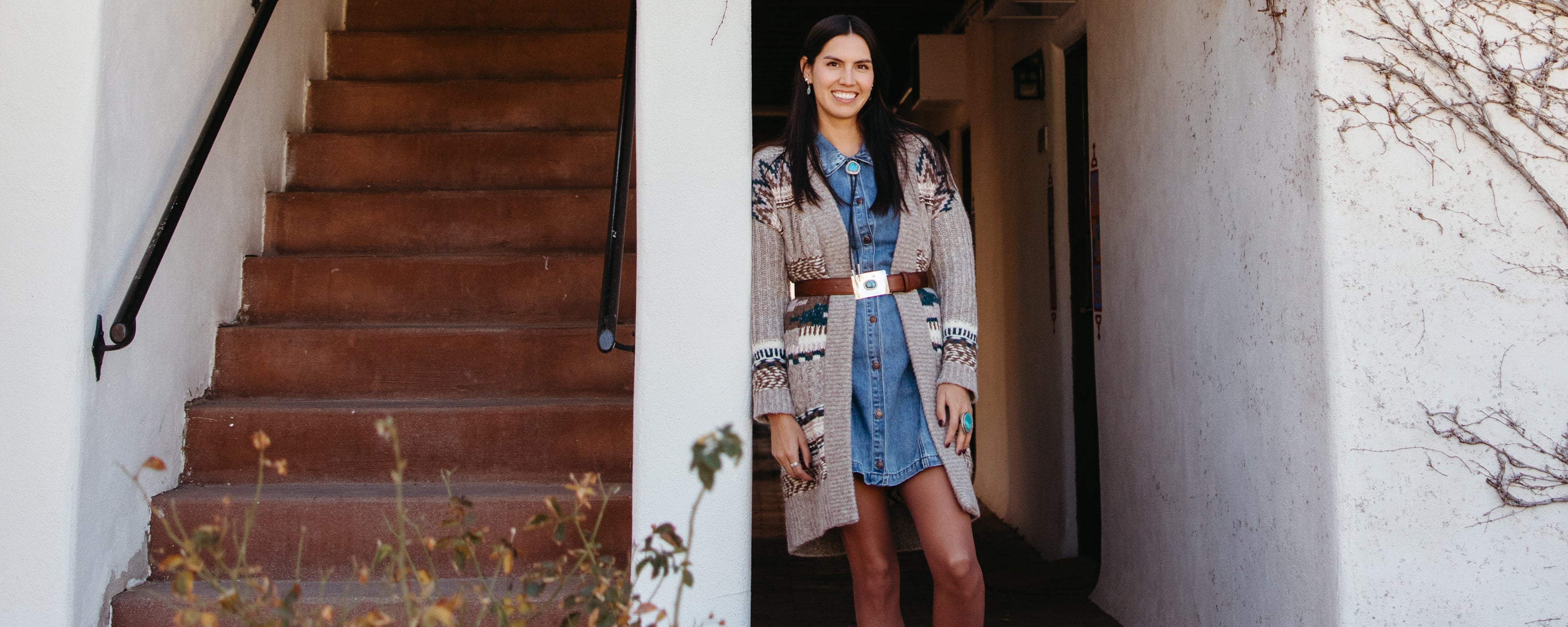
What led you to pursue knitwear design specifically?
The journey into the knitting industry has been an incredible one. Originally, I was only knitting for my family and friends as a means to give unique gifts for the holidays. Once I entered the knitting industry through Instagram, I soon realized that there was a real lack of genuine Native design. I decided to design my first beanie with a motif from a saddle blanket that I grew up seeing in my childhood home. My design was quickly asked to be picked up by a well-known knitting magazine and my journey took off from there.
This experience has allowed me to combine my passion for design with my desire to promote and preserve Native culture. I have found so much pride in what I do and this journey has helped me understand more of my identity. Using fiber and creating artwork is so valuable and connects me to my ancestors who used fiber to share their personalities and stories. I feel fortunate to be able to share something so personal and meaningful with the world while also creating a sustainable business for myself. I am excited to see what the future holds, as I continue to design, teach, and collaborate.
Can you share the story behind your Sheep Camp and Kinship patterns?
I designed the Sheep Camp sweater because I wanted a light sweater with a color yoke that reminded me of the comings and goings of everyday life. I desire peacefulness and harmony in my day to day life—a Navajo term called Hózhó means just this.
I often think about when Shimásání (my grandmother) used to herd sheep and how peaceful those days were. The motif on the sweater has arrows that draw inward like a deep inhale and at the same time pull outward, like a long slow exhale.
My hope for all of you is that as you wear your Sheep Camp sweater, remind yourself to take your time to slow down and breathe.
For the Kinship patterns, I began weaving a few years ago in the traditional Navajo way. I learned to set up my own stand-up loom, warp and all. My first weaving is a small sampler to help myself learn all the interlocks and processes it takes to create patterns within the warp. These designs are from different styles of rug designs throughout the reservation and all together, make a fun piece with so much connection.
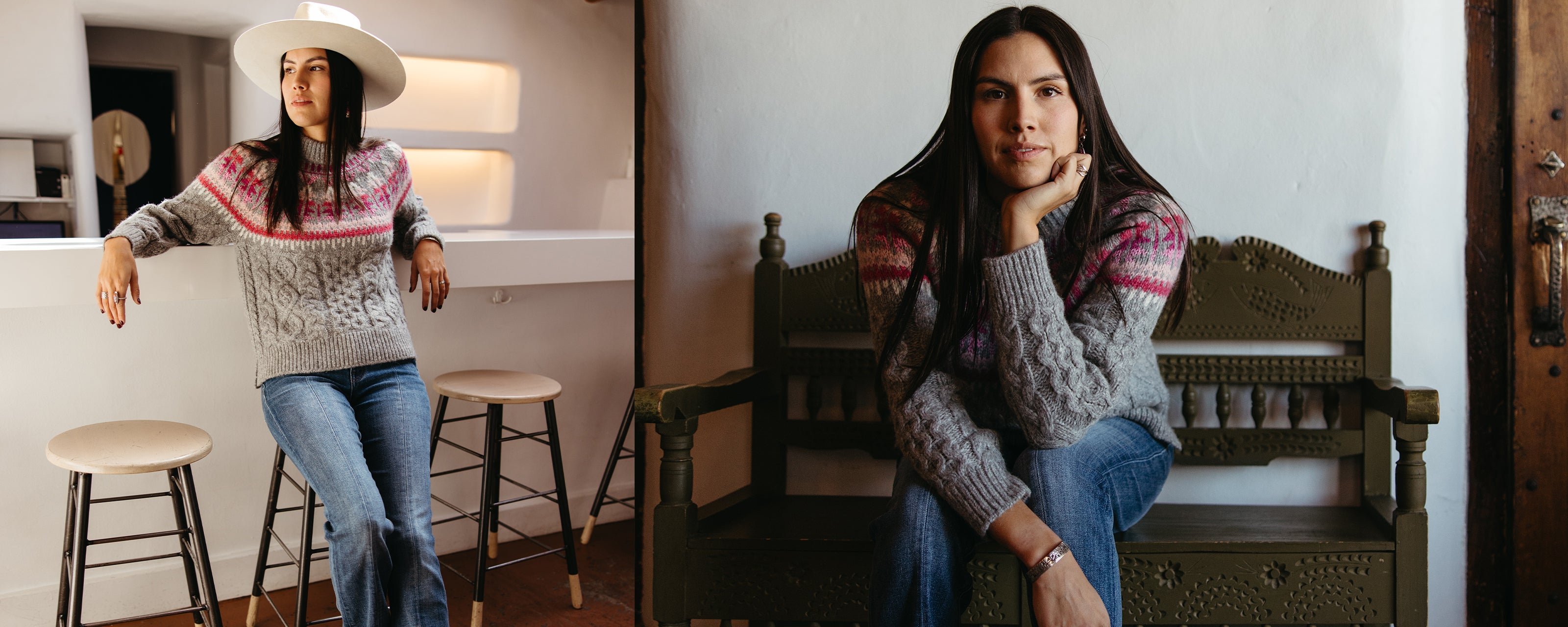
What role does sustainability and responsibility play in your work?
Knitting is such a sustainable craft. I work mainly with wool which is important to me. Not only does it pay tribute to the fiber in which my ancestors used to weave with, but it also is used to create classic designs that will be wearable for a lifetime. I have knit items from a family friend that I wore as a child and now my children are wearing. I also love the slowness and intentionality that comes with my craft. Tailoring items that I want to wear in colors and textures, allows for me to feel a sense of pride in each unique piece.
Also I have a skill that I can use with store bought knit sweaters. When an item is no longer wearable, the yarn can be rewound and used to create another item or I can patch or reimagine an existing piece.
How are you instilling your values and cultural pride in your children as they grow up and explore their creativity and passions?
One way is staying close to home. Although we live in Albuquerque, NM which is two hours from my Reservation, we take monthly trips home to give my children opportunities to pick up the Navajo language and experience life out of the city. Also family is so important and having that connection with their great grandmother and learning from her is extremely valuable.
I make efforts to educate my children about the history and struggles of the Navajo people. I share stories and legends passed down from our ancestors and teach them about the importance of our land, language, and traditions. It has given them a sense of pride and identity in being Navajo. Both of my children are very fair-skinned but they have been accepted into the tribe and I hope that by creating a space where our traditions, values, and language are celebrated, they will find their identities as being Navajo.
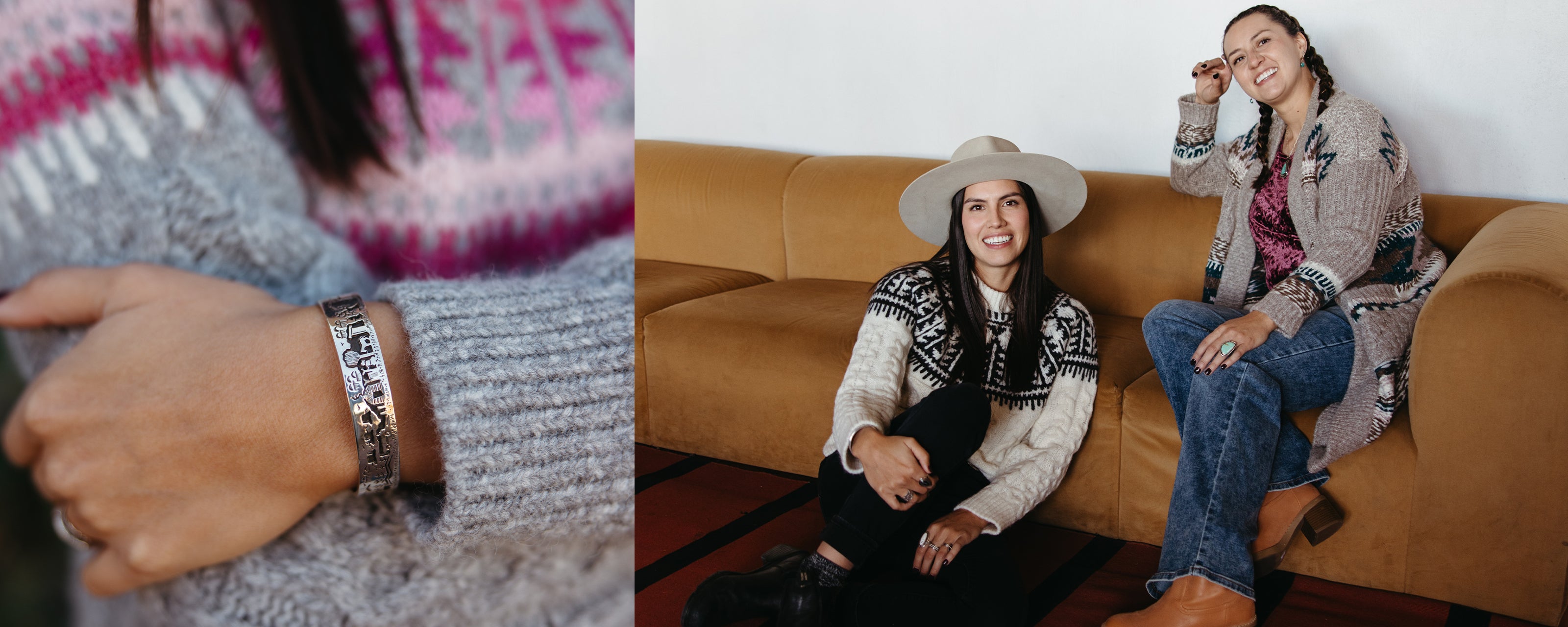
How has the journey of partnering with Faherty been? What’s it like seeing your designs come to fruition in this way?
Partnering with Faherty has been a whirlwind experience. It has been fun and honestly very low stress. The team has come around me to support and connect with who I am. I appreciate their values, their center on family, and their efforts in including Native designers. I’m so grateful that they took a chance on me and have made my knitwear designs more accessible to those who cannot make them.
Seeing my designs come to life on this scale has been exciting and has also given me a sense of relief. I have feared that my designs would be stolen and manufactured unethically without involving me through another company. I’ve seen my friends' designs be picked up by companies without their permission, then carelessly made and mass produced without any care of what the designs mean.
I appreciate the opportunity to be a part of this partnership that includes giving my permission, though the designs remain mine. I want the designs to have meaning to those who purchase them and when wearing them.
Do you have a favorite design that you can’t stop wearing from your Faherty collection?
I love the Kinship Cardigan so much. Its versatility with my wardrobe is amazing. I can belt it with my turquoise belt buckle to cinch in the waist or wear it loose and casual. It’s my new favorite travel item because it dresses up my outfit without compromising on comfort and ease of wear.
How would you like to see Native artists supported now and in the future?
On one side of the coin, I believe that Native people are often not met in their current circumstances and are misunderstood because of the cultural divide. I’m a firm believer in meeting people where they are. Seeing things from their perspective before assuming what you think you know. I have seen a disconnect between authenticity and virtue signaling which inevitably does nothing to truly uplift Native people.
On the other side, I have seen so many Native artists who are prospering in spaces that they were originally never invited into. I’m witnessing my friends walk into events and truly feel like they belong there. Companies like Faherty and so many others are celebrating Native peoples and this support encourages Native artists to continue creating and sharing their unique stories and experiences. It empowers them to be proud of their heritage and strengthens their sense of belonging in these spaces.
So, let us appreciate and celebrate the progress that has been made, but let's also recognize that there is more work to be done. By continuing to support and uplift Native artists, we can create a future where our unique perspectives are fully embraced and celebrated in all spaces.
LOVE KNITTING? TRY JENNIFER'S TWISTED SEED STITCH COWL KNITTING PATTERN ON YOUR OWN
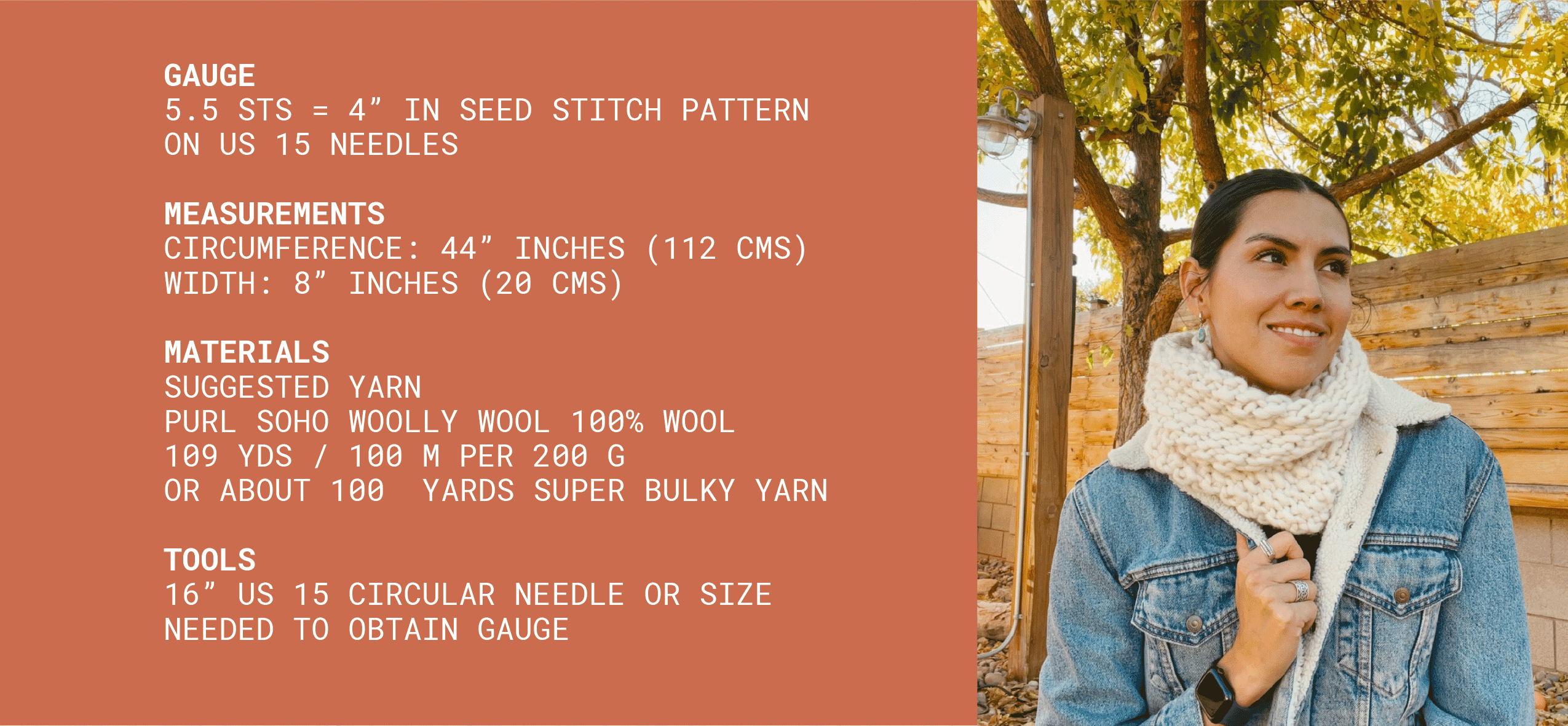
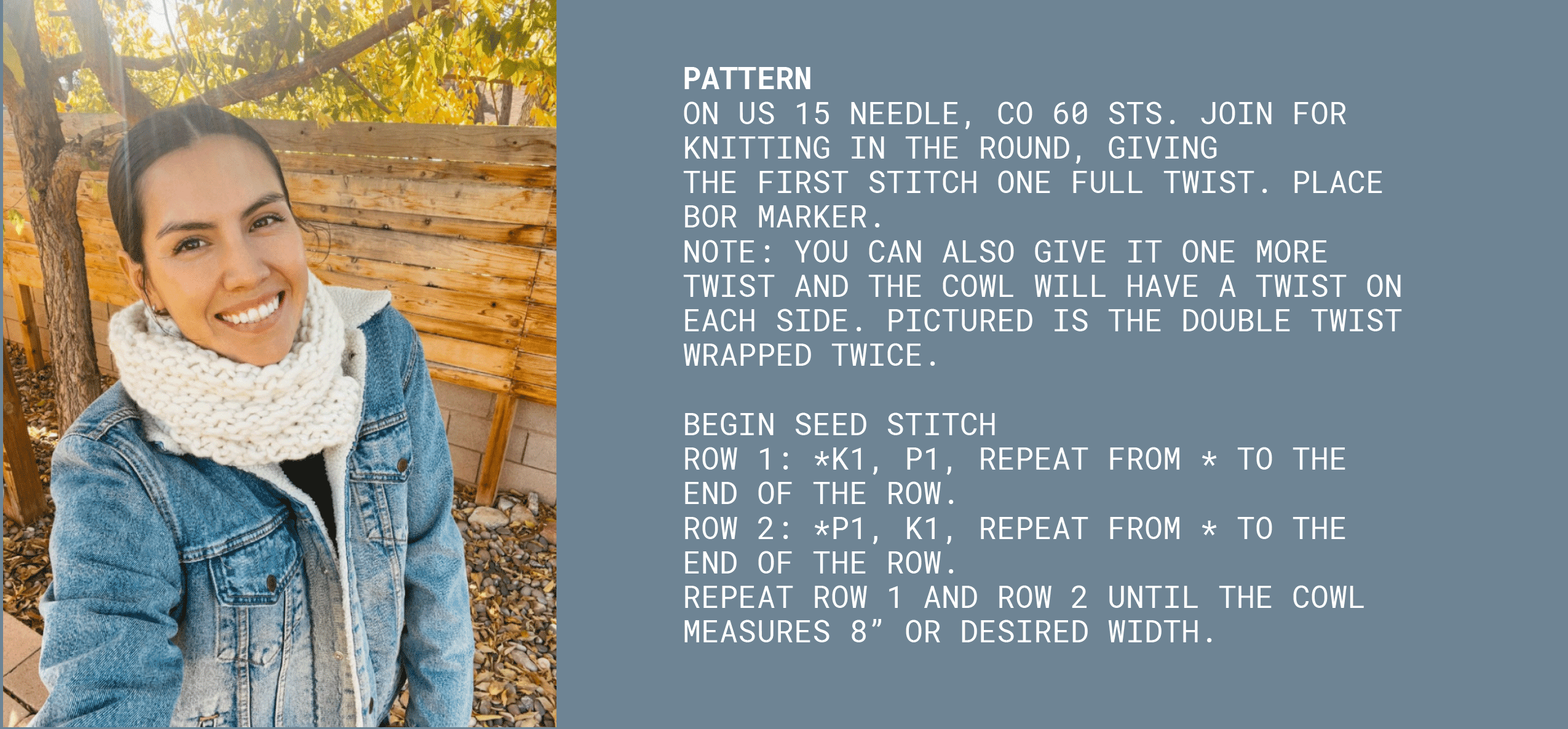





Share